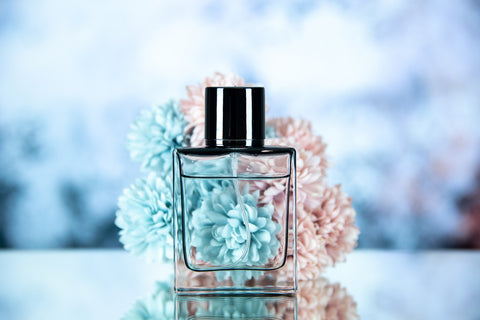Perfume is more than just a pleasant scent. It can influence our moods, memories, and even how we interact with the world around us. This outline explores the multifaceted impact of perfume on our lives, delving into its psychological, social, and practical effects.

The Psychology of Perfume
The psychology of perfume delves into the fascinating interplay between scent and our inner world. Perfumes aren't just pleasant smells; they can be powerful tools that influence our confidence, mood, and self-perception.
Confidence and Self-Esteem
The act of putting on a perfume we love can be a form of self-care, a ritual that prepares us to face the day. The pleasant scent creates an olfactory aura around us, and when we smell good, we tend to feel good about ourselves. This psychological boost translates to increased confidence and self-esteem.
- The Science Behind the Feeling: Studies suggest that pleasant scents activate the reward centers of the brain, releasing dopamine, a neurotransmitter associated with pleasure and motivation. This positive reinforcement loop can lead to a more confident and assertive demeanor.
- The Power of Olfactory Anchoring: Certain scents can become "anchors" to positive memories or experiences. For example, wearing a perfume that reminds you of a past success can trigger feelings of accomplishment and self-belief.
- The Olfactory Armor in Action: Imagine a job interview. Spritzing on a perfume you associate with power and competence can create a subtle psychological shift, making you feel more prepared and confident to take on the challenge.
Mood Enhancement
Perfume can be a powerful mood modulator. By strategically choosing a scent based on the desired emotional effect, we can subtly influence our inner state.
The Mood-Scent Connection
- Uplifting and Energizing: Citrus scents like lemon, grapefruit, and bergamot are known for their invigorating properties. They can be ideal for a morning pick-me-up, boosting alertness and focus.
- Calming and Relaxing: Floral scents like lavender, chamomile, and rose have a soothing effect on the nervous system. These are perfect for unwinding after a long day or promoting restful sleep.
- Sensual and Romantic: Warmer scents like vanilla, musk, and sandalwood can evoke feelings of intimacy and sensuality. These can be ideal for creating a romantic atmosphere.
The Placebo Effect: Even if we're not consciously aware of the scent's influence, the olfactory system can still trigger subtle changes in mood. Studies have shown that people exposed to pleasant scents report feeling happier and more relaxed compared to those in scent-neutral environments.
Creating a Personalized Fragrance Ritual: Experimenting with different scents based on your desired mood can be a fun and empowering practice. Perhaps a citrus spritz becomes your morning ritual for tackling the day, while a lavender scent signifies a transition into relaxation time.
Signature Scent: The Olfactory Fingerprint
A signature scent transcends mere fragrance; it becomes an extension of our personality, a unique olfactory fingerprint that announces our presence before we even speak.
- The Power of Personal Expression: Our choice of perfume reflects our tastes, preferences, and even our values. A person drawn to fresh, clean scents might project an image of sophistication and professionalism, while someone who favors bolder, more unique fragrances might be seen as creative and unconventional.
- The Olfactory Memory Trail: Our signature scent leaves a lasting impression on others. A familiar fragrance can trigger a memory of a person, a place, or a specific event. This creates a powerful connection that transcends words.
- The Evolving Olfactory Identity: Just like our personalities, our scent preferences can evolve over time. Our signature scent might change with age, life experiences, and even the seasons. Exploring different fragrances allows us to discover new facets of ourselves and express them through scent.
The psychology of perfume reveals the profound link between scent and self. By understanding how perfumes influence our confidence, mood, and self-perception, we can harness their power to create a more positive and fulfilling experience in our daily lives. From the confidence boost of a favorite scent to the mood-altering properties of various fragrance families, perfume becomes more than just an accessory; it becomes a tool for self-expression and inner well-being.

The Social Impact of Perfume
Perfume isn't just a personal indulgence; it's a powerful tool for nonverbal communication in the social sphere. The invisible aura of scent we create can influence how others perceive us, impacting everything from first impressions to interpersonal relationships.
The Silent Language of Scent: Nonverbal Communication
Perfume acts as a silent language, sending subtle messages about our personality, mood, and even social status. By understanding the cultural associations of different scent profiles, we can use fragrance strategically to navigate social situations.
Cultural Perceptions of Scent
- Floral Scents: Often associated with femininity, romance, and innocence. These can be ideal for creating a soft and approachable first impression.
- Fresh, Clean Scents: Project an image of cleanliness, professionalism, and sophistication. Ideal for work environments or formal occasions.
- Spicy Scents: Often perceived as bold, confident, and even mysterious. These can be a great way to stand out from the crowd and leave a lasting impression.
- Gourmand Scents: Sweet scents like vanilla or caramel can be perceived as playful, comforting, or even sensual, depending on the specific notes.
Beyond Gender Norms: Traditionally, certain scents have been associated with specific genders. However, fragrance preferences are becoming increasingly fluid. Choosing a scent that reflects your individual style, regardless of traditional gender norms, can be a powerful statement of confidence.
The Allure of Aroma: Attraction and Perception
The potential influence of perfume on attraction is a fascinating area of exploration. While scent alone might not be the sole determinant of attraction, research suggests it can play a subtle yet significant role.
- The Chemistry of Attraction: Pheromones, natural chemicals secreted by humans, can subconsciously influence attraction. Some studies suggest that certain perfume ingredients can mimic or enhance the effects of pheromones, making an individual appear more attractive to others.
- Cultural Variations in Scent Preferences: Scent preferences can vary dramatically across cultures. For example, the musky scent of oud, popular in the Middle East, might be considered overpowering in Western cultures. Understanding these variations is crucial for appropriate social navigation.
- The Power of Memory and Emotion: A familiar perfume can trigger powerful memories and emotions. A pleasant scent associated with a positive past experience can subconsciously lead to feelings of attraction towards the person wearing it.
Leaving a Lasting Impression: The Art of Memorable Fragrance
A well-chosen perfume can leave a lasting positive impression on others, making us more approachable and memorable.
- The Olfactory Memory Trail: Our sense of smell boasts an exceptional memory. A pleasant perfume can linger in the air long after we've left, creating a positive olfactory memory trace in the minds of those we meet.
- Confidence Through Scent: When we feel good about the way we smell, it translates into increased confidence in social interactions. This confidence can make us appear more approachable and outgoing, fostering positive social connections.
- Breaking the Ice with Scent: The right perfume can act as a social lubricant, sparking conversations and creating a sense of connection with others. A unique or pleasant scent can be a conversation starter, prompting compliments or inquiries about the fragrance.
- Finding the Balance: It's important to strike a balance between making an impression and being overpowering. Strong scents can be offensive in close quarters. Opting for lighter concentrations or applying strategically to pulse points can ensure a pleasant and memorable fragrance experience for others.
The social impact of perfume reveals its power to shape our interactions with the world around us. By understanding how scent influences nonverbal communication, attraction, and our ability to make lasting impressions, we can leverage fragrance as a strategic tool to navigate the social landscape with confidence and grace.

Choosing the Right Perfume
Finding the perfect perfume is a personal journey of exploration and discovery. Understanding the building blocks of fragrance, how scent interacts with your body chemistry, and aligning your choice with your personality are key steps in creating a signature scent that feels uniquely you.
Decoding the Fragrance Symphony: Understanding Fragrance Notes
A perfume's complexity lies in its blend of various fragrant ingredients, each contributing to the overall scent profile at different stages. Understanding the concept of fragrance notes is essential for appreciating the nuances of a perfume and choosing one that resonates with you.
- The Top Notes: These are the first scents you perceive upon application; they're light and volatile, creating the initial impression. Common top notes include citrus notes (lemon, grapefruit), light florals (lavender, bergamot), and fruity notes (apple, pear). They typically last for about 15-30 minutes.
- The Heart Notes: Also known as the middle notes, these emerge after the top notes fade and form the core of the perfume's character. They are typically richer and more complex, often including floral notes (rose, jasmine), spicy notes (cinnamon, cardamom), and herbal notes (lavender, rosemary). Heart notes last for several hours, forming the heart of the fragrance experience.
- The Base Notes: These are the most persistent scents, emerging as the middle notes fade. They provide depth and warmth to the perfume and can linger for several hours or even all day. Common base notes include musks (white musk, ambrette), woody notes (sandalwood, cedarwood), and oriental notes (vanilla, amber).
The Art of Olfactory Harmony: Matching Perfume to Personality
The perfect perfume complements your personality and style, creating a harmonious olfactory expression. Here's how to choose a scent that reflects you:
- Consider Your Style: Are you drawn to classic elegance, bold experimentation, or a touch of whimsy? Classic scents with clean lines and floral or citrus notes might suit a minimalist style. Bold, spicy, or oriental scents can complement a more adventurous personality.
- Think About Your Mood: Do you gravitate towards uplifting and energizing scents or calming and relaxing ones? Citrus scents can be great for a pick-me-up, while lavender or vanilla might be ideal for unwinding.
- Explore Fragrance Families: Familiarize yourself with different fragrance families like floral, oriental, woody, and fresh. Experiment with scents within each family to discover what resonates with you.
Finding Your Signature Scent: A Personal Olfactory Journey
Finding your signature scent is a process of exploration and experimentation. Here are some tips to guide you:
- Sample, Sample, Sample: Don't be afraid to try numerous samples before committing to a full bottle. Visit department stores or fragrance boutiques and request samples to wear throughout the day.
- Body Chemistry Matters: The way a perfume interacts with your unique body chemistry plays a crucial role in its final scent. The same perfume can smell vastly different on two individuals. Wear a sample for several hours to see how it evolves on your skin before making a decision.
- The Power of Layering: Layering fragrances allows you to create a personalized scent profile. For example, try layering a fresh citrus scent as a top note with a warmer vanilla base for a unique and dynamic fragrance experience.
- Embrace the Journey: Finding your signature scent takes time and exploration. Enjoy the process of discovering new fragrances and learning more about your olfactory preferences.
Choosing the right perfume goes beyond smelling good; it's about creating a personal olfactory statement. By understanding fragrance notes, aligning your scent with your personality, and embracing the journey of exploration, you can find a signature perfume that reflects your unique essence and leaves a lasting impression.
Conclusion
Perfume's impact on our lives extends far beyond a pleasant aroma. It's an invisible symphony that plays on our emotions, shapes our self-perception, and influences how we navigate the social world.
The Emotional Orchestra: The olfactory system's direct connection to the emotional centers of the brain allows perfume to become a powerful mood modulator. Uplifting citrus notes can energize our mornings, while calming lavender scents can ease us into relaxation. Certain scents can even trigger vivid memories, transporting us back to cherished moments and the emotions associated with them.
The Olfactory Mirror: The perfume we choose becomes an extension of ourselves, reflecting our personality and self-image. A confidence-boosting scent can empower us to face the day, while a calming fragrance can center us during stressful situations. Our signature scent becomes a unique olfactory fingerprint, leaving a lasting impression on others.
The Social Stage: Perfume plays a subtle yet significant role on the social stage. It acts as a form of nonverbal communication, sending messages about our personality, style, and even social status. A well-chosen fragrance can make us more approachable and leave a lasting positive impression on those we meet. Conversely, an overpowering scent can be off-putting, making it crucial to strike a balance between making an impression and being respectful of others' olfactory space.
The Power of the Invisible: Perfume is more than just a cosmetic product; it's a powerful tool that enriches our daily experiences in profound ways. From influencing our mood and self-perception to shaping our social interactions, the invisible symphony of scent plays a vital role in our lives. Imagine a world devoid of fragrance – a world without the comforting aroma of a loved one's perfume, the energizing scent of a citrus grove, or the evocative power of a memory triggered by a familiar scent. Perfume adds a rich layer of sensory experience to our world, reminding us of the profound impact even the most invisible elements can have on our lives. So next time you reach for your favorite fragrance, take a moment to appreciate the invisible symphony it creates, one that shapes your emotions, your self-perception, and your connection to the world around you.

